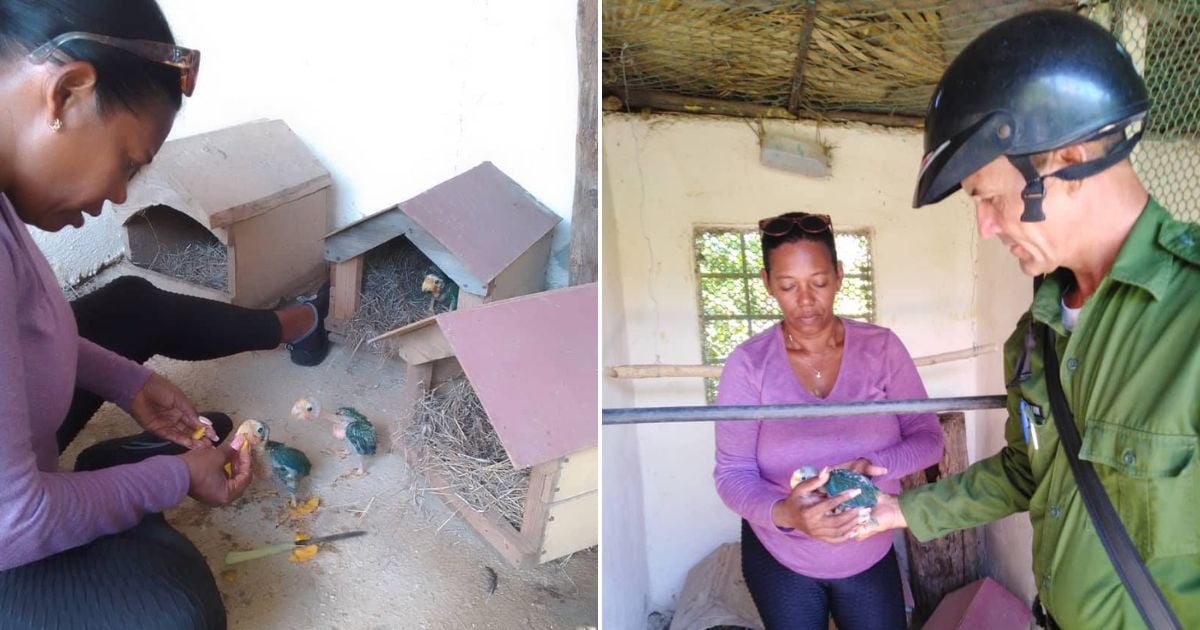Authorities in Villa Clara apprehended two men involved in the illegal trafficking of 10 parrot chicks intended for sale in Havana. The operation, led by Quiala Armenteros, the director of the Office of Environmental Regulation and Safety (Orsa Citma) in Villa Clara, was a collaborative effort with the Forest Ranger Corps and the Revolutionary National Police (PNR). The individuals were caught at kilometer 259 of the National Highway.
At this location, the suspects, one from Sancti Spíritus and the other from Cuba's capital, were intercepted. After their arrest, they were taken to a PNR unit where environmental regulations were enforced against them. The rescued parrot chicks were transported to the aviary within the Sabana de Santa Clara Protected Area, where they will remain under supervision before being returned to a controlled natural environment.
In a subsequent statement, Armenteros highlighted the status of the Cuban parrot (Amazona leucocephala) as a threatened species on the International Union for Conservation of Nature (IUCN) Red List, making its commercial trade illegal. He urged the public to report any attempt to sell this species on social media to the PNR as it constitutes a potential crime against biodiversity.
A recent online advertisement offering at least 12 Cuban parrot chicks for 5,000 pesos each prompted concerns over the unregulated trade of protected wildlife in Cuba. Activist Ana Belkys Hernández Millán took to Facebook to express her outrage in an open letter, criticizing the blatant and unchecked sale of this endemic and vulnerable species on social media, complete with photos, prices, and contact details, as if it were a legitimate business tolerated by authorities.
Animal welfare group Bienestar Animal Cuba (BAC), in its Havana chapter, recently exposed the illegal sale of an injured black vulture, which was being marketed as a common commodity in a WhatsApp group. According to BAC-Habana's Facebook page, protector Avril Gutiérrez discovered the advertisement on April 30, 2025, at 4:10 PM in the "Compra y Venta Güinera" group. A user named Mirelsy had posted the sale of the bird, identified as the Cathartes aura, confined in a cage and visibly mistreated.
Similarly, in April, a social media post showing an owl captured and offered for sale in Havana sparked outrage among internet users and animal rights advocates. The incident occurred on a Tuesday when user Marlon Enmanuel Fernández shared a reel in the "Alamar el barrio" Facebook group, depicting the owl trapped inside a metal bucket covered with a wooden board.
Recently, the organization Protección Animal SOS – PASOS reported through social media the death of an owl, rescued after being illegally offered for sale on a social media page. The owl, allegedly captured for religious purposes, was purchased by activists for 5,000 Cuban pesos after bargaining down the initial price of 10,000, as stated by the organization on Facebook.
Understanding the Illegal Wildlife Trade in Cuba
Why is the Cuban parrot considered a threatened species?
The Cuban parrot is classified as a threatened species because of its declining population, habitat loss, and illegal trade practices, as outlined by the IUCN Red List.
What actions are taken against illegal wildlife traders in Cuba?
In Cuba, individuals caught engaging in illegal wildlife trade face legal consequences under environmental regulations, which may include fines, arrests, and the confiscation of trafficked animals.
How can the public help prevent wildlife trafficking?
The public can help by reporting any suspicious activity or attempts to sell protected species to the authorities, such as the PNR, and by raising awareness about the importance of preserving biodiversity.
What role do social media platforms play in wildlife trafficking?
Social media platforms can unfortunately act as a marketplace for illegal wildlife trade, allowing traffickers to reach a wider audience under the guise of legitimate transactions. It is crucial for platforms to monitor and regulate such activities to prevent illegal trade.
